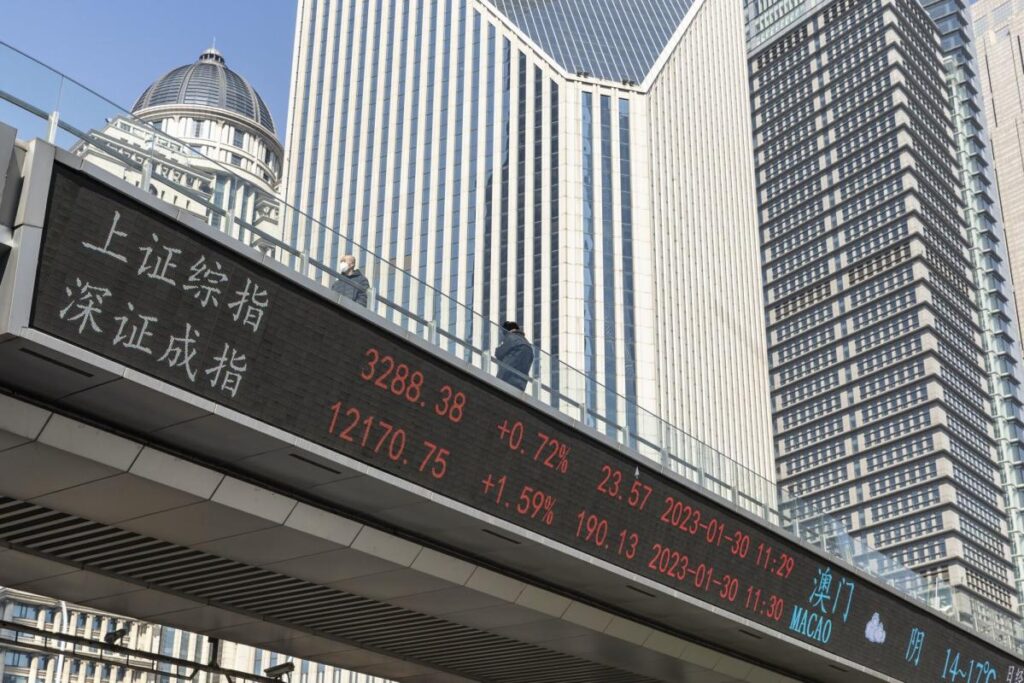(Bloomberg) — A selloff in Chinese assets deepened on Wednesday, with a key equity gauge set to erase all gains seen since last month’s Politburo meeting and the yuan falling toward a 16-year low.
Most Read from Bloomberg
The MSCI China Index dropped as much as 1.3% amid mounting concerns over economic growth, set to close below where it was before policy vows at the July political gathering triggered a rally. The Hang Seng China Enterprises Index is within a whisker of wiping out its gains, while the Hang Seng Index slid 1.4% to inch closer to a technical bear market.
Pressure is building across China’s financial markets given a slew of disappointing economic data, renewed concerns about the property sector and an unfolding crisis in the nation’s shadow banking system. All of this is creating deflationary pressure that threatens to undermine corporate profits. Investors are calling for more aggressive easing by Beijing as the incremental policies have so far failed to revive confidence.
“China’s current recession-like conditions, characterized by deflationary pressures, have significant implications for both its domestic economy and its global interaction,” said Manish Bhargava, a fund manager at Straits Investment Holdings in Singapore. “Investors might become wary of allocating funds to China due to concerns about the economic downturn and reduced potential returns.”
Market reaction to a spate of stimulus steps has been muted, underscoring the extent of investor pessimism. The selloff persisted following a Wednesday report that authorities have asked some investment funds this week to avoid being net sellers of equities. A surprise interest rate cut by the People’s Bank of China on Tuesday and a potential stamp duty cut on stock trades have also failed to move the needle.
The price actions today were “another classic day” for China stocks despite the supportive measures, said Willer Chen, senior analyst at Forsyth Barr Asia Ltd. “People are losing patience. With just piecemeal policies, they are getting more and more concerned about the economy.”
Overseas investors again offloaded Chinese stocks via the links with Hong Kong, extending the net selling streak to the eighth session.
In the currency market, the PBOC moved again on Wednesday to boost fragile sentiment with a stronger-than-expected reference rate for the yuan and the largest injection of short-term cash to the financial system since February. The measures came as the onshore unit fell toward its weakest since 2007 against the dollar.
The central bank is tasked with keeping the currency stable while aiming to boost the economy — two ambitions that can often be in conflict. A weak yuan may dampen the appeal of China assets to overseas investors, while local firms may be reluctant to convert foreign currencies into yuan given the wide yield differential with markets like the US.
Dimming Outlook
The outlook for China’s economic growth is dimming, with investment banks around the world cutting their 2023 forecasts. JPMorgan Chase & Co.’s team lowered its full-year projection to 4.8%. As recently as early May, the bank had been predicting a 6.4% expansion, among the highest calls.
Sentiment was hit further as the latest data showed home prices falling again in July. The property sector’s turmoil has been at the center of China’s economic troubles given its importance to growth and implications across household wealth and the financial system.
“Negative China sentiment has been reverberating through markets and PBOC’s rate cut has again suggested that calls for a massive stimulus may be misplaced,” said Charu Chanana, market strategist at Saxo Capital Markets.
–With assistance from Abhishek Vishnoi and Ishika Mookerjee.
Most Read from Bloomberg Businessweek
©2023 Bloomberg L.P.


